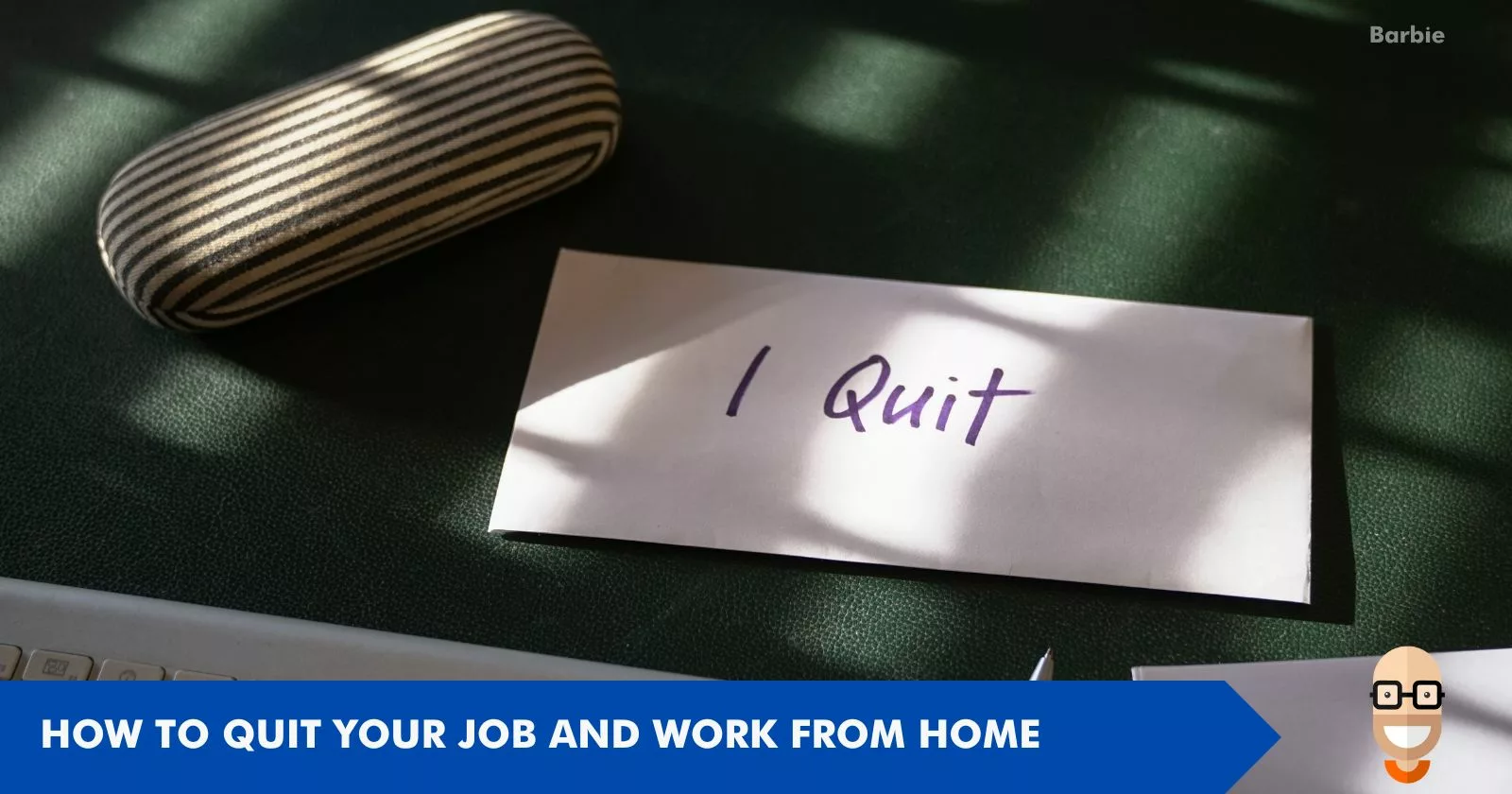
If you’re feeling burnt out or unfulfilled at your current job, you may be considering quitting and working from home. Working remotely has become increasingly popular in recent years, and for good reason. It offers flexibility and freedom, allowing you to work from anywhere in the world and manage your own schedule. However, before you make the leap, it’s important to understand the potential challenges and benefits of working from home.
One of the main reasons people choose to work from home is to achieve a better work-life balance. When you work remotely, you have the ability to set your own schedule and work around your personal life. Additionally, you can save time and money by eliminating a commute and working from the comfort of your own home. However, it’s important to note that working from home can also blur the lines between work and personal life, making it difficult to disconnect and establish boundaries.
Overall, quitting your job and working from home can be a great decision for some people. However, it’s important to carefully consider the potential benefits and challenges before making the switch. In this article, we’ll explore the different aspects of quitting your job and working from home, including emotional health, work-life balance, and job search strategies.
In this post, you will learn
- Working from home offers flexibility and freedom, but it’s important to understand the potential challenges and benefits before making the switch.
- Achieving a better work-life balance is one of the main reasons people choose to work from home, but it can also make it difficult to establish boundaries between work and personal life.
- Before quitting your job and working from home, it’s important to explore different work-from-home options and plan your resignation carefully.
Understanding the Desire to Quit

If you are considering quitting your job and working from home, it’s important to understand your reasons for doing so. The decision to resign from a job can be difficult, and it’s important to make sure that you are making the right choice.
The current job market is experiencing the “Great Resignation,” where many people are quitting their jobs due to a variety of reasons. Some of the reasons include burnout, a lack of work-life balance, and a desire for more flexibility. If you are experiencing any of these factors, it may be time to consider quitting your job.
Before quitting your job, it’s important to assess your situation and determine if it’s the right decision for you. Make a list of the reasons why you want to leave your job and why it could be beneficial to stay. This will help you clarify your thoughts and make an informed decision.
There are also signs that indicate it’s time to leave your job. If you are experiencing exhaustion, burnout, or dread when approaching work, it may be a sign that it’s time to move on. Other signs include feeling undervalued, unchallenged, or unsupported in your role.
Ultimately, the decision to quit your job and work from home is a personal one. It’s important to take the time to assess your situation and determine if it’s the right choice for you. If you do decide to quit, make sure to do so in a professional manner by giving proper notice and tying up loose ends before leaving.
Emotional Health and Work-Life Balance
When it comes to quitting your job and starting to work from home, it’s important to consider the impact on your emotional health and work-life balance.
Working from home can be a great way to improve your emotional health by reducing stress and increasing flexibility. However, it can also lead to feelings of isolation and loneliness, especially if you are used to working in a team environment. According to a 2021 survey from the American Psychological Association, almost two-thirds of respondents working from home reported feeling isolated or lonely, while 17% said they feel that way all the time.

Further reading: What Is The Best Affiliate Program for a Beginner?
To maintain a healthy work-life balance when working from home, it’s important to set clear boundaries between work and personal time. This could include creating a designated workspace, establishing set working hours, and taking regular breaks throughout the day.
It’s also important to prioritize self-care activities, such as exercise, meditation, or spending time with loved ones, to avoid burnout and maintain a healthy emotional state.
Finally, it’s important to recognize the signs of burnout and take action to address them. Burnout is a state of physical or emotional exhaustion that also involves a sense of reduced accomplishment and a loss of personal identity. If you start to experience symptoms of burnout, such as chronic fatigue, irritability, or decreased productivity, it may be time to reassess your work situation and make changes to improve your emotional health and work-life balance.
Overall, quitting your job and starting to work from home can have a positive impact on your emotional health and work-life balance, but it’s important to be aware of the potential challenges and take steps to address them.
Benefits of Working from Home
Working from home has become a popular choice for many people, and for good reason. Here are some of the benefits you can enjoy when you work from home:
Flexible Schedule
One of the biggest benefits of working from home is the flexibility it offers. You can choose your own work hours, which means you can work when you’re most productive and take breaks when you need them. This can lead to a better work-life balance and a more relaxed lifestyle.
No Commute
When you work from home, you don’t have to worry about commuting to work. This means you can save time and money on transportation costs and avoid the stress of rush hour traffic. Plus, you can use the time you save to do other things, like exercise, spend time with your family, or work on a side project.

Increased Productivity
Studies have shown that people who work from home are often more productive than those who work in an office. This is because they have fewer distractions and interruptions, and they can focus more easily on their work. Plus, they can set up their workspace in a way that suits their needs and preferences, which can lead to increased comfort and efficiency.
Improved Health
Working from home can also have a positive impact on your health. For example, you can take breaks to stretch or exercise throughout the day, which can help reduce the risk of health problems like obesity and heart disease. You can also prepare healthy meals at home, which can save you money and help you maintain a balanced diet.
More Time for Family and Friends
When you work from home, you can spend more time with your family and friends. You can take breaks to have lunch with your kids or go for a walk with your spouse. This can help you build stronger relationships and enjoy a more fulfilling personal life.
Overall, working from home offers many benefits that can improve your lifestyle and work experience. Whether you’re looking for more flexibility, better health, or more time with loved ones, working from home can be a great choice for you.
Potential Challenges of Working from Home
Working from home can be a dream come true for many people. It offers the flexibility to work in your own space, avoid the daily commute, and have more control over your work-life balance. However, there are also potential challenges that you need to be aware of before making the switch.
Distractions
One of the biggest challenges of working from home is dealing with distractions. When you work in an office, you have a dedicated workspace that is designed to help you focus on your tasks. At home, you may have to deal with distractions like family members, pets, or household chores that can make it difficult to concentrate.
Isolation
Working from home can also be isolating, especially if you are used to working in a busy office environment. Without coworkers to chat with or a boss to check in with, it can be easy to feel disconnected from the rest of the world.
Time Management
When you work from home, it can be easy to lose track of time and work longer hours than you intended. Without the structure of a traditional office environment, it’s up to you to set your own schedule and manage your time effectively.
Lack of Boundaries
Another potential challenge of working from home is the lack of boundaries between your work and personal life. It can be tempting to check your work email or take a quick phone call during your off hours, but this can quickly lead to burnout and a lack of work-life balance.
Pandemic and Remote Work
The COVID-19 pandemic has led to a surge in remote work, with many companies encouraging or requiring their employees to work from home. While this has been a necessary measure for public health and safety, it has also highlighted some of the challenges of remote work, such as the need for reliable internet access and the difficulty of maintaining work-life boundaries when your home is also your workplace.
Rest and Work-Life Balance
Rest and work-life balance are crucial for maintaining your physical and mental health. When you work from home, it can be tempting to work longer hours or skip breaks, but this can quickly lead to burnout and decreased productivity. It’s important to set clear boundaries between your work and personal life, take regular breaks, and prioritize self-care to avoid burnout and maintain your overall well-being.
Exploring Work from Home Options
If you’re considering quitting your job and working from home, there are a few things you should consider to ensure a successful transition. Here are some tips for successfully working from home:
What are some tips for successfully working from home?
- Create a designated workspace: Having a dedicated workspace can help you stay focused and productive. Make sure it’s a quiet, comfortable space that’s free from distractions.
- Set a schedule. When you work from home, it can be easy to blur the lines between work and personal time. Set a schedule and stick to it to maintain a healthy work-life balance.
- Stay connected: Working from home can be isolating, so it’s important to stay connected with colleagues, clients, and other professionals in your field. Use video conferencing tools like Zoom or Skype to stay in touch.
- Take breaks: It’s important to take regular breaks throughout the day to avoid burnout. Get up, stretch, and take a quick walk to refresh your mind and body.
What are some legitimate work-from-home opportunities?
There are many legitimate work-from-home opportunities available, including:
- Freelance work: If you have a specific skill set, such as writing, graphic design, or programming, you can offer your services as a freelancer. Websites like Fiverr and Upwork can help you find clients.
- Consulting: If you have expertise in a particular field, you can offer your services as a consultant. You can work with clients remotely and offer advice and guidance on a variety of topics.
- Work from home jobs: Many companies offer remote work options for their employees. You can search for work-from-home jobs on websites like Indeed or FlexJobs.
Remember to do your research and be cautious of scams when looking for work-from-home opportunities.
Related Posts:
Planning Your Resignation
When you decide to quit your job and work from home, it’s essential to plan your resignation carefully. Doing so will help ensure that you leave your current position on good terms and avoid burning bridges with your employer. Here are a few steps you can take to plan your resignation professionally:
Check Your Contract
Before you submit your resignation, review your employment contract to determine your notice period. In most cases, you will need to give your employer at least two weeks’ notice before your last day of work. However, some contracts may require a longer notice period, so make sure you know what’s expected of you.
Schedule a Meeting with Your Manager
Once you’ve decided to resign, schedule a meeting with your manager to discuss your decision. During this meeting, be clear and direct about your intentions to leave. Thank your manager for the opportunities you’ve had while working for the company and offer to help with the transition process.
Submit Your Resignation Letter
After you’ve met with your manager, submit your resignation letter. Your letter should be brief and professional, outlining your intention to leave the company and your last day of work. You can use a resignation letter template to help you get started.
Prepare for Your Exit
During your notice period, make sure you tie up any loose ends and complete any outstanding projects. You should also remove any personal files from your work computer and return any company property you may have. Doing so will help ensure that you leave your current position on good terms and avoid burning bridges with your employer.
Planning your resignation carefully is essential when you decide to quit your job and work from home. By following these steps, you can leave your current position professionally and avoid any negative consequences that may come from burning bridges with your employer.
Job Search and Transition Strategies
When you decide to quit your job and work from home, it’s important to have a plan in place. Here are some job search and transition strategies to help you make a smooth transition:
1. Start Your Job Search Early
It’s important to start your job search early, especially if you have a specific date in mind for when you want to quit your job. This will give you enough time to find a suitable job offer and make a smooth transition.
2. Update Your Resume and Online Profiles
Before you start your job search, make sure to update your resume and online profiles. This will help you stand out to potential employers and increase your chances of getting hired.
3. Network and Reach Out to Contacts
Networking is a great way to find job opportunities, especially when you’re looking to work from home. Reach out to your contacts and let them know that you’re looking for a job. They may be able to refer you to a company or connect you with someone who is hiring.
4. Prepare for the Interview Process
When you start getting job offers, it’s important to be prepared for the interview process. This may include preparing for video interviews, practicing your interview skills, and researching the company and position.
5. Have a backup Plan
It’s always a good idea to have a backup plan in case your job search takes longer than expected. This may include having some savings set aside or having a part-time job to help cover your expenses while you search for a full-time job.
6. Give Proper Notice When You Quit Your Job
When you do receive a job offer and decide to quit your current job, it’s important to give proper notice. This will give your employer enough time to find a replacement and ensure a smooth transition for your team.
By following these job search and transition strategies, you can make a successful transition from your current job to working from home.
Conclusion
Congratulations on making the decision to quit your job and work from home! This can be a big step, but with the right preparation and mindset, you can make it a successful transition.
Remember that the purpose of quitting your job is to find a better work-life balance and improve your overall well-being. It’s important to have a clear plan and set goals for yourself so you can stay focused and motivated.
Here are a few key takeaways to keep in mind:
- Make sure you have a solid financial plan in place before quitting your job. This includes having enough savings to cover your expenses for several months as well as a clear understanding of your new income streams.
- Create a dedicated workspace in your home that is comfortable, quiet, and free from distractions. This will help you stay focused and productive during work hours.
- Set clear boundaries with your family and friends so they understand that just because you’re working from home doesn’t mean you’re available for socializing or other non-work-related activities during work hours.
- Stay organized and disciplined with your work schedule. Create a routine that works for you and stick to it as much as possible. This will help you stay on track and avoid procrastination.
- Take care of your physical and mental health. Working from home can be isolating and stressful, so make sure you’re taking breaks throughout the day to stretch, exercise, and connect with others.
Remember, quitting your job and working from home is a big change, but it can also be a rewarding and fulfilling experience if you approach it with the right mindset and preparation. Good luck on your new journey!
Looking for a Legitimate Work From Home Opportunity?
Check out my #1 Recommendation
Frequently Asked Questions
How can I prepare financially before quitting my job to work from home?
Before quitting your job to work from home, it’s important to have a solid financial plan in place. Here are some steps you can take to prepare financially:
- Create a budget: Start by creating a budget that takes into account your current expenses and projected income. This will help you determine how much money you need to make each month to cover your expenses.
- Build up your savings: It’s a good idea to have at least 3-6 months worth of living expenses saved up before quitting your job. This will give you a financial cushion while you build up your work-from-home income.
- Pay off debt: If you have any high-interest debt, such as credit card debt, it’s a good idea to pay it off before quitting your job. This will reduce your monthly expenses and free up more money for savings.
- Consider part-time work: If you’re not quite ready to quit your job yet, consider taking on part-time work while you build up your work-from-home income. This can help you make a smoother transition financially.
How can I effectively communicate my decision to quit my job to my employer?
When communicating your decision to quit your job to your employer, it’s important to be professional and respectful. Here are some tips for effective communication:
- Schedule a meeting. Request a meeting with your employer to discuss your decision to leave. This will give you the opportunity to explain your reasons for leaving and answer any questions your employer may have.
- Be honest: Be honest about your reasons for leaving, but avoid being negative or critical. Focus on the positive aspects of your decision to work from home.
- Offer to help with the transition: Offer to help train your replacement or assist with the transition in any way you can. This will help ensure a smooth transition for your employer and your coworkers.
- Give notice: Give your employer ample notice before your last day of work. Two weeks is the standard, but if you have a more senior position, you may need to give more notice.
By following these tips, you can effectively communicate your decision to quit your job to your employer and leave on good terms.
“Here’s a little transparency: Our website contains affiliate links. This means if you click and make a purchase, we may receive a small commission. Don’t worry, there’s no extra cost to you. It’s a simple way you can support our mission to bring you quality content.”

